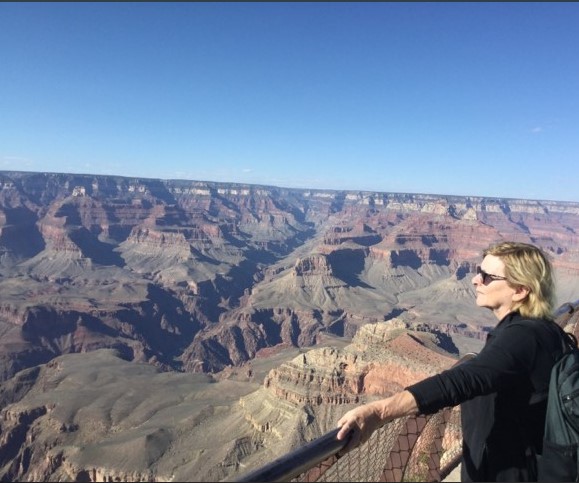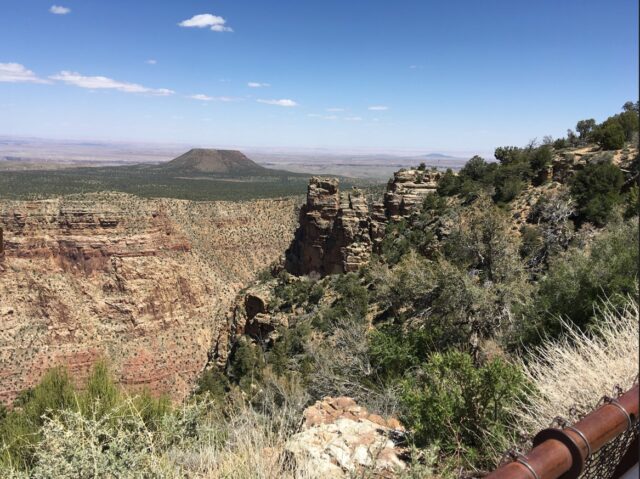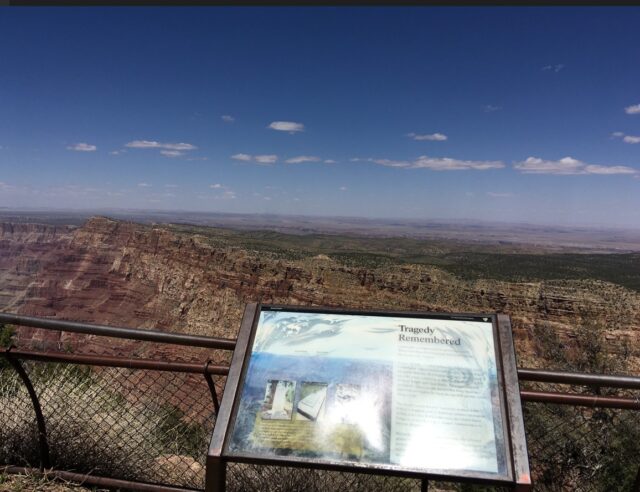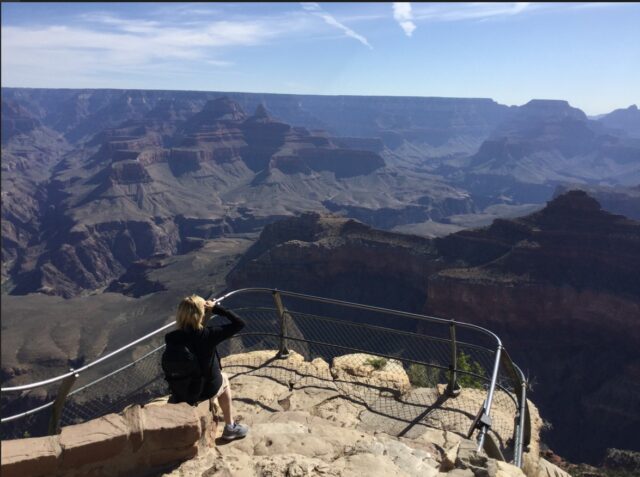
I’m just back from a road trip that included the Grand Canyon. The place is beyond spectacular and I’ll spare you my clumsy attempt to try to capture its spirit. Instead, I thought I’d tell you the story of a plane crash.
At 9:01 am on June 30, 1956, 64 passengers and six crew left Los Angeles airport on TWA Flight 2 to Kansas City following a 31-minute maintenance delay. Three minutes later, United Flight 718, also running behind schedule, left for Chicago with 53 passengers and five crew.
United Captain Bob Shirley’s Douglas DC-7 climbed to 21,000 feet, while TWA Captain Jack Gandy, 41 took his Lockheed Super Constellation to 19,000 feet. Both crews estimated they would cross the Painted Desert line just after 10:30 am.
Two thousand feet should have been more than enough room to pass each other safely, but through a series of mishaps, both planes found themselves on the same altitude. From the original newspaper reports, it seems like both may have deviated from their course to do some sightseeing.

This meant both planes were in uncontrolled airspace, and it was the pilot’s responsibility to look out for other aircraft, especially with the cloud cover.
At 10:31 am, the left wing of the United plane hit the tail of the TWA and smashed into the fuselage. The left engine propeller tore into the rear cabin. Both planes fell virtually straight down and burst into flames. All 128 people died. It was the largest commercial airline disaster at the time.
I asked Travis Shelongosky what the likelihood is of a mid-air collision these days. Travis, a former air accident investigator with the Transportation Safety Board of Canada, says not very.
“Things were a lot different back then. These days everybody is in communication all the time. Part of that is satellite. Part of that is repeaters on the ground and better radios. Secondly, all planes now have transponders and that’s a kind of radio that tells Air Traffic Control where you are. All commercial aircraft now have Traffic Alert and Collision Avoidance System (TCAS), and that tells everybody where all other planes are. The fourth thing, and maybe the biggest change to aviation, is GPS.”
Ultimately, the dead pilots shouldered the blame.
Good thing a pilot no longer relies on sight, because according to Travis, that was always unreliable.
“There’s a weird phenomenon with air collisions and it has to do with the fact that the human eyeball is really good at seeing motion but it’s not really good at picking up still things,” he says. “If two planes are on a collision course, each one will appear stationary to the other pilot. The background stays the same and it doesn’t matter how fast one plane is going compared to the other. What the pilot sees is simply a dot that’s getting larger. That’s why nowadays all planes have flashing strobes.”

For more information see “Into the Abyss: The 1956 Grand Canyon Mid-Air Collision.”
Other Sources:
- The Arizona Republic, July 2, 1956
- The Arizona Republic, June 30, 2006

© All rights reserved. Unless otherwise indicated, all blog content copyright Eve Lazarus.




11 comments on “Grand Canyon: a Series of Unfortunate Events”
What a tragic story! All for a bit of sightseeing…but it’s good that accidents like this have led to improvements in flight safety.
BTW, the link to “Into the Abyss” is not working.
Thanks for that – should be working now!
Yes, it is – thanks. Glad you enjoyed the Grand Canyon. We took my dad down there on a marathon driving trip – it was a place he always wanted to see. We also saw some other fascinating places in the southwest. We had 3 weeks and 3 drivers in Dad’s big air conditioned car…
Thank you Eve. All your stories are interesting.
And, thank you so much for taking the time to comment!
Thank you Eve. I also agree that your articles are so well presented and researched. Any outcome of an activity that is seemingly mundane can be altered dramatically when you through in the human element because we are the random factor in the equation.
Thank you. Appreciate you taking the time to comment
Another interesting story,keep up the great work
Glad you enjoyed it!
I visited the Grand Canyon on a road trip in 1975. I loved it. Speaking of airplane sightseeing, I was on a flight from Los Angeles to Vancouver in early 1980 when Mt. St. Helen’s was active and smoking but had not yet erupted. It was the “Champagne Flight” where free food and wine flowed on the trip. The pilot came on the PA system and said we were about to fly over Mount St. Helens, and in order for everyone to view it he gave the following direction: “Everyone hold on to your drinks, and I will tilt the plane to the right for a minute, and then to the left for a minute so everyone can have a look.” And so he did, and we got a good view.
What a tragedy. Been to the Grand Canyon threes times but never saw this crash information plaque.